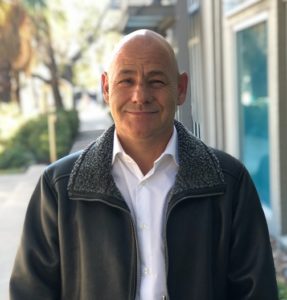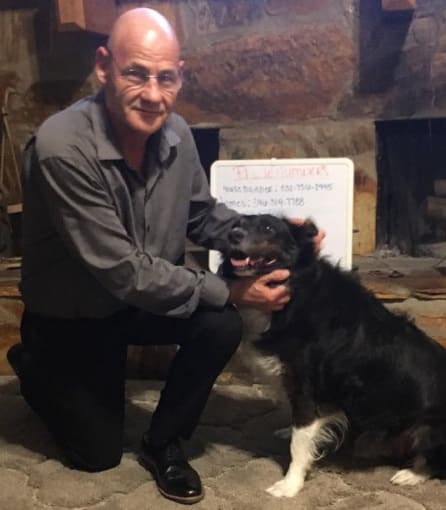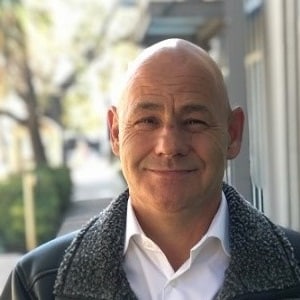The remarkable path to recovery for “the guy panhandling on the street corner”
by Vicki Powers
before: A military childhood riddled with trauma is the backbone of this story. Charles fought substance use disorder for 30 years and had Hepatitis C. Police arrested him 300 times for a host of offenses that all related to trying to use drugs. He left more than 125 jobs. A severe work injury caused him to lay in bed for 29 months. His girlfriend panhandled with his border collie, Buddy, on a street corner in NW Houston making $900-$1,500 per week supporting his heroin binge. Charles’ girlfriend died of an overdose in their hotel room just weeks after Hurricane Harvey. Then he had no choice…
 after: People kept miraculously offering help at just the right time that pieced together a new life. He began dedicating his time to giving back. He is now three years sober, earned his peer recovery support specialist certification completing 1,500 community service hours. He works at Matthew’s Hope Foundation, as director of outreach and marketing, helping people get into detox. He lives in an Oxford House (a community for people in recovery) and serves as a chapter chair.
after: People kept miraculously offering help at just the right time that pieced together a new life. He began dedicating his time to giving back. He is now three years sober, earned his peer recovery support specialist certification completing 1,500 community service hours. He works at Matthew’s Hope Foundation, as director of outreach and marketing, helping people get into detox. He lives in an Oxford House (a community for people in recovery) and serves as a chapter chair.
“The things that make the big things possible are the little things. I’m most proud of the little things.”
*********
The first thing Charles Owens said when our interview started: “I’m 52 years old, and I’ve never had an apartment in my name. Ever.”
background
For his entire childhood, Charles Owens heard how his birth ruined his mother’s life. Her dream to work as a nurse overseas in Women’s Army Corp (WAC) was squashed. His mother and father married and divorced each other four times. The household, with four children, was filled with physical abuse. Then his dad died when Owens was 10.
“That’s a lot of trauma on a 10-year-old,” he states.
Owens drank his first beer at 11 and smoked his first joint at 13. He was sent from Massachusetts to Kentucky to live with his grandmother, because he was uncontrollable. She did the best she could to raise him, he said, which was not bad.
“I had everything I wanted, but there was no foundation for love and stability,” Owens says. “I just took and took and took.”
a self-described failure
Owens described himself as a failure at everything – never completed anything. To follow his military parents, he joined the military and did what he was supposed to do. But he got bored and quit. Same with college. And he easily quit more than 125 jobs, with some top-of-the-line companies like GE, GM, and the Department of Defense.
“I could never put anything together. Ever,” Owens said. “I just couldn’t do it. It didn’t matter how much money I made or the relationship I was in.”
For 30 years, Owens said he did drugs, drank alcohol, abused himself, and abused the people around him. His whole life was a constant battle to use and use and use. Police arrested him 300 times for a host of offenses that all related to trying to use drugs: panhandling, DWIs, DUIs, drug possession, shoplifting, and more. At one point in his life, Owens got two DUIs a year for 10 years. It wasn’t driving under the influence of alcohol but everything else: narcotics, cocaine, marijuana, and crack.
street life
Owens became an expert at telling lies and getting sober long enough to get a job, to get a paycheck, to get to that motel to get the drugs. That’s what he did for 30 years.
“I was an expert at it,” he states. “But I would always fall short and fall off. But it didn’t matter, because I knew I could always get back up.”
Until he couldn’t. The unthinkable happened, and Owens got injured at work when a steel staircase fell on him. His femur cracked and broke off at the hip joint gouging the inside of his pelvis. This time there was no getting up. Owens describes it as having a dead limb. He couldn’t get out of bed for three months, not even to use the bathroom.
“I wouldn’t even go to the doctor,” he says. “I stayed screwed up on heroin for two years after that.”

Charles and his dog, Buddy. He acquired Buddy as a puppy from a cow farm when he worked in North Dakota. Buddy, like Charles, had been homeless until they started living at Oxford House.
Owens’ girlfriend panhandled every day while they lived in a hotel, because that’s all they knew. They tried a few programs, but in their minds, it was easier “flying the sign,” i.e., standing on the street corner with a sign asking for money. Sometimes Owens would go out with his girlfriend and sit in a wheelchair. He had his border collie, Buddy, with them so “it looked like we had it going.” One guy paid their $1300 hotel bill each month.
“He just kept coming to pay,” Owens says. “That perpetuated like two years of a massive heroin binge.”
“Because of my dog on that corner on that day, I got clean and my life back.”
Owens describes his last location at I-10 and Barker Cypress as his “famous corner,” where they stood, day after day, for five months. It was their consistent location, and everyone knew them. He said he loves that corner and goes by it all the time.
“If I told you how much I made a week, you would be sick,” Owens shared honestly. “It’s a lot. Between $900 to $1,500 a week. People didn’t know I was spending it on heroin. It’s no life though.”
angel people
“I don’t know if they are miracles, right place right time, or anything like that. I don’t really question it.”
September 29, 2017 is the day everything changed for Owens. His girlfriend died in their hotel room of a heroin overdose. He was so addicted he didn’t care about her family or anything. His only thought: “Now what am I going to do?” His girlfriend had been panhandling for them. He couldn’t walk or drive. He tried to take his life through drugs, but he kept waking up.
angel #1: Owens decided to go out asking for money even though he had never done it by himself. He used crutches to get to his corner, but he couldn’t maneuver well. Plus, the rain made the ground muddy where he needed to stand.
“I was trying to hold myself up and hold the sign. I tried to walk and my crutch sank into the mud, and I fell over,” Owens said. “A lady got out of her car to help me stand back up and said, ‘Will you please go home?’”
Owens said that was the most demoralizing moment in his life. That was the last day he used. “I got sober that day.”
“I don’t know if they are miracles, right place right time, or anything like that. I don’t really question it.”
angel #2: The next morning, a woman called out of the blue to check on Owens. She was involved in animal rescue and had befriended Owens and his girlfriend through Buddy when she stopped to check his condition on a really hot day. Nothing was wrong with Buddy. Instead, she gave Owens a Big Book, the basic text of Alcoholics Anonymous. She didn’t push anything (like religion or getting clean) and continued to check-in with them by phone.
When she called September 30, Owens told her that his girlfriend died the night before. Without hesitation, she came to pack his belongings and took him to a sober living facility. She started a GoFund Me page for him to cover his rent. And brought cigarettes every week, which kept him going. She also found a woman to keep Buddy for a month since he was not allowed at the sobering living facility.
angels #3 and #4: Buddy’s caretaker brought Buddy to visit on weekends. On the second visit, she discovered Owens’ leg was injured from a work accident. Her husband, who was an attorney, agreed to take on his worker’s comp case as long as Owens got witness statements and the necessary paper work. That connection proved to be emotionally and financially powerful for Owens. With the attorney’s help, he was awarded 29 months of back-pay and a $325,000 surgery that repaired his leg.
“There were tons of obstacles to overcome,” he says. “By all rights, I did not deserve the money.”
angel #5: Owens was required to attend an AA meeting every day in order to stay at the sober living house. He met a man in AA who then showed up every day to give Owens a ride to the meeting. The man became his sponsor and is still his sponsor today.
“That guy never stopped coming…every day,” Owens says. “He told me if I didn’t get involved and help people, I would never get clean. No matter how little it was to start, just help people.”
Owens took that message to heart, and it changed his life.
helping others
As his sponsor suggested, Owens threw himself into helping others – and continues to do so today. First it was as simple as writing resumes for people. So many people in AA were struggling to get jobs, and Owens was a “professional at writing resumes” and a “professional job getter.” It worked, and he stayed busy doing resumes.
When he got his truck and driver’s license, it evolved into giving people rides and taking them to jobs. It was a start.
“There were tons more failures than successes, but it kept me going,” Owens says. “In the Big Book it says something about that.”
“He told me if I didn’t get involved and help people, I would never get clean. No matter how little was to start, just help people.”
Another person heard Owens was a veteran and asked him to drive his clients from the VA Hospital in Houston to Austin at $300/trip. He said, “Cool, I’m your guy.” Driving veterans to Austin has been one of the most rewarding experiences for Owens. He tells them, “For two-and-a-half hours you’re stuck with me, and I’m going to tell you my story. And tell you that if I could do it, anyone could do it.”
Owens never says no to these driving requests and still gets a couple of calls a month. It is the best opportunity to catch a guy who has literally been getting high the day before. “I literally just try to help everybody on a daily basis,” Owens says. “I wish my grandmother could see me sober.”
clear of Hep C
Owens’ involvement with Houston Recovery Center started when he was almost a year sober. Someone suggested he call HRC to get help with Hepatitis C through its REACH program. He contacted Jackie Williams, a REACH peer recovery support specialist, and she met him at the sobering center. He knew the location. He had done drugs outside of it in the past.
“Jackie was so sweet, she would call me once or twice a week,” he says. “She said you have to follow all the Hep-C treatment steps.” Owens followed the steps, took the medication for 90 days and got cleared of Hepatitis C, after 30 years with it.
“That’s a big deal to me. Like a big, big deal,” Owens says. “It’s huge. It’s hard for any addict to follow through with things. Even sober addicts.”
Williams stayed connected supporting his job search and did a tour at Heights Hospital, during his job stint there, because he wanted to show her what he was doing.
new life
After Owens’ girlfriend overdosed in 2017, his life seemed hopeless. What enabled him to turn things around and be successful? He says he didn’t have any other choice.
“I really believe that’s what it was,” Owens relates, “because when I did have a choice, I would just continue to do what I had been doing.”
For those who struggle with substance use disorder, Owens says their time will come if they just keep trying. It’s stacked against us, he says.
“I don’t know why I got lucky,” he states. “Three years ago you couldn’t have told me I was lucky. Instead, I would have been really upset.”
Owen’s new life started at the sober living house, the only place in Houston that would take him. He lived in a bunk bed for 11 months and ate bologna sandwiches and cereal three times a day.
“I was so bored at the house and miserable,” Owens says. “I couldn’t go anywhere because of my leg. As long as I had my cigarettes, my AA meeting, and my dog, I was OK. I looked so forward to going to that AA meeting every day.”
“The things that make the big things possible are the little things,” Owens says. “I’m most proud of the little things.”
success
Today, Owens has earned his PRSS certification with 1,500 community service hours. He works at Mathew’s Hope, as the director of outreach and marketing. Michael Lohan, dad to celebrity Lindsay Lohan, came to Houston to start Matthew’s Hope Foundation, a nonprofit helping those who struggle with opioid use disorder, and contacted Owens out of the blue.
“He just heard about me,” Owens relates. “That’s awesome. I literally have to get people into detox. That’s what I do.”
Owens’ life is filled with sober people, and he markets the program all he can. Of the 800 contacts in his phone, 750 are sober people in recovery or working in recovery. He describes himself as the veteran/Medicare/Medicaid guy in Houston.
“I get calls from people all across the country asking for assistance,” he says. “That’s what my life is consumed of being sober – and it’s a good life. I wouldn’t trade it for nothing.”
